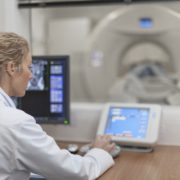Are your Back MRI results reliable? Research says otherwise.
Whenever pain flares up – one of the most popular questions and concerns I get from clients is whether or not they need an MRI. When you have persistent pain that won’t go away, or shooting pain or numbness down your arm or leg, it’s scary. It makes sense to get a look inside with an MRI, right?
Not necessarily.
MRI’s are an amazing technological advancement that will literally show you everything that is going on in your spine. But what we now know from research is that all those findings on an MRI don’t always correlate with what’s actually causing your pain.
One notable study was the Lancet series – three published papers that investigated how MRI findings related to the treatment of back pain. Martin Underwood, MD, co-author of the Lancet series, and professor at Warwick Medical School, is quoted in The Guardian saying: “If you get into the business of treating disc degeneration because it has shown up on an MRI, the likelihood is that, in most of those people, it is not contributing to their back pain.”
Let me explain.
When it comes to back problems – or joint problems in general – what most people don’t realize is that 70-80% of all spine and musculoskeletal problems are what we call “mechanical” in nature. That means your pain has to do with the way you move, bad postural habits learned over the years, or muscular and joint imbalances like weakness and poor flexibility. Many of these mechanical “wear and tear” problems don’t show up until your 40’s, 50’s or 60’s – which coincidentally is also the time that things like disc degeneration and other age-related changes show up on an MRI.
What it’s important to understand is that disc degeneration, arthritis, and bulging discs are ALL a normal part of aging, but they often get blamed for problems they don’t actually cause. In other words, the source of your pain is often a movement dysfunction learned and repeated over time that is irritating you – not the age-related changes themselves. The best way to figure out if your problem is movement-related vs structure-related is… well… with a movement assessment… NOT an MRI.
So how does movement testing work and why is it more reliable than an MRI?
This is a great question and not one that is easily explained… but I’m going to try!
When your back, neck or joint pain is mechanical in nature – one of the most important things to look at and pay attention to is how your pain behaves. Not necessarily where it’s located. With pain – the most important thing to determine is how it reacts against certain triggers and with different activities.
Does your pain come and go? Do you have good days and bad days? Can you change positions and influence your pain?
When your pain is variable, it’s the most reliable sign that your pain is “mechanical” in nature. It also means you don’t need surgery or any kind of procedure to fix it. In fact, a procedure or surgery could leave you feeling worse off than before. Let’s say you “cut out” the structure – or inject it to make it numb – your movement problem hasn’t gone away and it’s only a matter of time before it starts aggravating something else.
Take home point…
MRI’s are a super powerful and amazing diagnostic tool – but their results when it comes to diagnosing neck, back, or joint pain MUST be taken with a grain of salt – and should absolutely be coupled with an expert mechanical joint evaluation before you decide on a treatment plan.
Because if you are dealing with chronic, long-standing aches and pains that have come and gone over the years – or have recently gotten worse – there is a 70-80% chance that it is a mechanical problem finally catching up to you and not a structural problem.
Figure out the root source of your neck, back, or joint pain by seeing a movement expert who specializes in mechanical pain FIRST. Because when you automatically assume that you need an MRI first, and you base your whole treatment plan off of those results – you can end up down a rabbit hole of unnecessary medical procedures or surgery that ultimately won’t give you the long-term relief you’re looking for.
Are you local to Portsmouth, NH?
Consider speaking to one of our specialists by clicking here.
Dr. Carrie Jose, Physical Therapy Specialist and Mechanical Pain Expert, owns CJ Physical Therapy & Pilates in Portsmouth, NH, and writes for Seacoast Media Group. If local to Portsmouth, NH, and looking for help, request a FREE Discovery Visit with one of her Specialists by CLICKING HERE.


